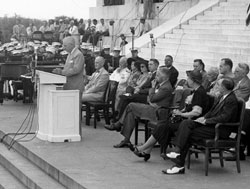The National Communication Association has honored Dr. Allison Prasch, assistant professor of Communication Studies in the College of Liberal Arts at Colorado State University, with the 2017 Golden Monograph Award for her 2016 article, “Toward a Rhetorical Theory of Deixis.”
Prasch will be formally presented the award on Saturday, November 18, at the 103rd Annual NCA Convention held in Dallas, Texas. The Golden Anniversary Monograph Award was created to mark NCA’s 50th Anniversary in 1964 and is presented to the most outstanding scholarly article or book chapter published during the previous calendar year.
Deixis comes from the Greek word epideixis, which means to display or show forth. “This is what deictic words do: they point audience members to specific places, moments, or people around them,” Prasch says. “This important for rhetoric because it helps us understand where and how speakers use language to direct their audiences to the contextual elements of the rhetorical situation as evidence.”
Prasch first began thinking and reading about deixis in graduate school while working on an essay on President Reagan’s 1984 speech at Pointe du Hoc. Looking to connect methods of close textual criticism with a growing body of literature on space/place, materiality, and public memory, Prasch wanted to find some way to account for how Reagan invoked the “boys of Pointe du Hoc” and the “sheer and desolate cliffs” behind him as a powerful form of evidence.
“I was convinced that both the text and the physical scene mattered—not just to my own scholarly curiosity, but to Reagan himself, to his immediate and extended audience, and to those of us who still read and teach the speech today,” says Prasch.
She applied linguistic theories to her own methods of rhetorical analysis, and discovered that identifying Reagan’s deictic utterances within the speech itself “revealed a text that is inextricably linked to its location. She calls that analysis her first “test run” of the theory of deixis. Her thinking and research led to her dissertation project on U.S. presidential invocations of place during the Cold War.

June 29, 1947
“Toward a Rhetorical Theory of Deixis” represents portions of the theory chapter from her dissertation and one of her case studies on President Harry S. Truman’s 1947 Address to the National Association for the Advancement of Colored People (NAACP) at the Lincoln Memorial on June 29, 1947. The article first appeared in the March 2016 issue of the Quarterly Journal of Speech, one of 11 journals produced by NCA.
Prasch says winning the award is encouraging. “I wondered many times during the research and writing if I was on to something, or if I was heading down a rabbit trail that would lead to nowhere,” she says. “It is also humbling to join a long line of distinguished scholars — two of whom come from my own department — who have received this award in previous years.”
More than anything, she says, the award demonstrates the importance of being a part of a community of learners. “This project began five years ago and has been presented at NCA, workshopped at the Rhetoric Society of America Summer Institute, and discussed over lunches and dinners and drinks more places than I can remember,” she says. “It is the product of many smart colleagues who took time out of their own busy lives and careers to offer feedback and encouragement.
She is currently writing a book that examines how Cold War U.S. presidents linked their foreign policy objectives to particular geographical locations and, in so doing, extended the United States’ physical and metaphorical presence in the world during key moments in the Cold War struggle between democracy and communism.
This past summer she spent two weeks in Europe doing fieldwork for the book and was finally able to visit the site of Reagan’s Pointe du Hoc address.
“I tried to imagine myself as a member of Reagan’s audience on June 6, 1984, particularly as one of the 62 U.S. Army Rangers who climbed those cliffs forty years earlier and now sat and listened to the president recount their bravery,” Prasch says.
“As a scholar and critic, it was at that moment that the power of deixis—a speaker’s rhetorical display of people and places and moments that materially instantiate their overall argument—became even more apparent. One of the exciting things to me about integrating deixis with rhetorical theory is that it offers a vocabulary for investigating and, at times, recreating the spatial, aural, visual, and embodied aspects of rhetorical performance for contemporary audiences.”